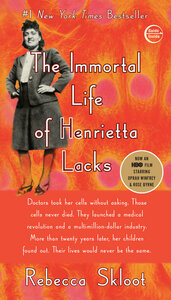Take a photo of a barcode or cover
informative
inspiring
sad
medium-paced
dark
emotional
reflective
medium-paced
challenging
emotional
informative
sad
medium-paced
challenging
informative
reflective
medium-paced
Fascinating story, and really appreciated how the afterward connected the story to ongoing questions about tissue samples.
While I did enjoy the book and feel that its a very important story to tell, I kinda wish the author told it a bit differently. I can't say how differently, but I just didn't like how much the book seemed to be about herself. There are other reviews that state this better.
I'm ridiculously tired right now, so this review is not going to do this book justice. I'm not one to read non-fiction, usually, because I tend to get a little bored. I could not put this book down. First of all, full disclosure, I'm a lab tech and I actually work in a virology lab with cell cultures. It was fascinating to learn about how one came to be and, at the same time, infuriating. It's insane to think how much our medical and research laws have changed in such a very short time and what people who were supposed to be caring for people could get away with back in the day.
Either way, this book touched me. It truly did. A very good read that I would highly recommend.
Either way, this book touched me. It truly did. A very good read that I would highly recommend.
it took me two attempts to finish this, but it was genuinely incredible.
of particular interest to me was the talk about consent and who deserves to make money from people’s bodies.
of particular interest to me was the talk about consent and who deserves to make money from people’s bodies.
Everyone who has read this book should also read Ron Lacks book https://www.amazon.com/Henrietta-Lacks-Untold-Story-Ron/dp/1098307429/ref=sr_1_1?crid=2ZZMMDPHNI9GO&keywords=ron+lacks&qid=1640732364&sprefix=ron+lacks+%2Caps%2C84&sr=8-1
emotional
informative
inspiring
slow-paced
I don't know how to feel about this. I was outraged by the indiscriminate use, distribution and sale of the cancer cells of Henrietta Lacks without consent or compensation or acknowledgment.
The story should have focused on Henrietta and her story, and the use of her cancer cells, and it does, but but a large part of this book included the author herself doing research and nearly harassing the family to get what she wanted. The book would have been much shorter if she'd stuck to the family and the story, not documenting everything she did to dig for information.
I would have liked more info about how He-La cells changed medicine, and skip anything to do with the author being part of this.
I also felt really uncomfortable reading what I feel was private interactions of the family that reflected them poorly; it's embarrassing. Were we meant to understand that Day was responsible for the illnesses of Henrietta and the difficulties the children were born with because of his STI's? maybe that was pertinent because of her HPV.
Could this have been handled in a more respectful way? Focusing on more science, less family drama and zero author inserting herself?
This feels important and interesting, but I'm sure the family's fears of intrusion were realized with the publication of this book.
The story should have focused on Henrietta and her story, and the use of her cancer cells, and it does, but but a large part of this book included the author herself doing research and nearly harassing the family to get what she wanted. The book would have been much shorter if she'd stuck to the family and the story, not documenting everything she did to dig for information.
I would have liked more info about how He-La cells changed medicine, and skip anything to do with the author being part of this.
I also felt really uncomfortable reading what I feel was private interactions of the family that reflected them poorly; it's embarrassing. Were we meant to understand that Day was responsible for the illnesses of Henrietta and the difficulties the children were born with because of his STI's? maybe that was pertinent because of her HPV.
Could this have been handled in a more respectful way? Focusing on more science, less family drama and zero author inserting herself?
This feels important and interesting, but I'm sure the family's fears of intrusion were realized with the publication of this book.





